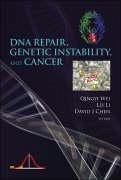This volume describes the elaborate surveillance systems and various DNA repair mechanisms that ensure accurate passage of genetic information onto daughter cells. In particular, it narrates how the cell cycle checkpoint and DNA repair machineries detect and restore DNA damages that are embedded in millions to billions of normal base pairs. The scope of the book ranges from biochemical analyses and structural details of DNA repair proteins, to integrative genomics and population-based studies. It provides a snapshot of current understanding about some of the major DNA repair pathways, including base-excision repair, nucleotide excision repair, mismatch repair, homologous recombination, and non-homologous end-joining as well as cell cycle checkpoints and translesion DNA synthesis. One of the particular emphases of the book is the link between inherited DNA repair deficiencies and susceptibility to cancer in the general population. For the first time, the book brings together a collection of review articles written by a group of active and laboratory-based investigators who have a clear understanding of the recent advances in the fields of DNA damage repair and genomic stability and their implications in carcinogenesis, new approaches in cancer therapy, and cancer prevention.








